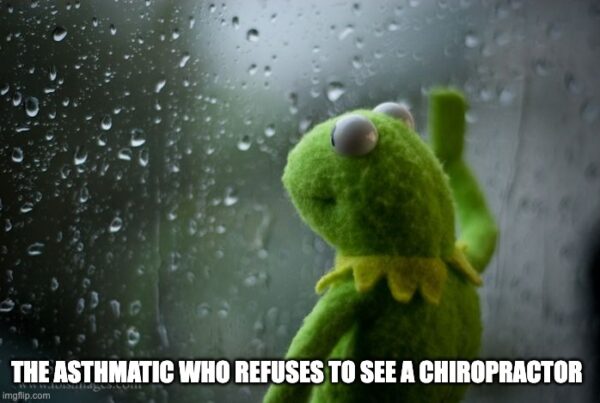The gut-brain connection is one of the most powerful duos.
Unlike that last one, the gut and brain’s relationship is not a one-way street. Our brain dictates digestion and how those nutrients are used to power our bodies.
While the microbes in the gut play a crucial role in our everyday function by absorbing the nutrients we need to make it through the day, that same microbiome impacts stress, anxiety, depression, and cognition.
As a chiropractor for digestive health in Springfield, IL, I refer to the gut as the second brain. (I made that up; no one else says or has ever said that.)
While our central nervous system is the main computer for our body, the enteric nervous system lives in our gut and has more than 100 million nerve cells. That’s more than are in our spinal cord!
Our gut isn’t going to help us debate the existence of soulmates or answer the question, “Is the Earth flat?” it developed a mind of its own to make digestion more efficient, and in many ways, it does “talk” to the brain.
Effects on Depression
A healthy gut transmits signals that are a part of brain neuron formation and behavioral control. Seems like a lot of responsibility for an organ that grumbles when it doesn’t get enough cheese. Or sometimes when it gets too much.
Researchers have confirmed that inflammation in the gut can affect brain chemistry. In one study, 20% of patients with inflammatory bowel disease noted they were depressed. Another study noted that patients saw improvement in their depression when they took a probiotic. An improvement in gut health led to improved mental well-being.
Effects on Anxiety
We’ve all heard of the phrase “fight or flight,” at least those of us who were bullied in middle school. It’s a physical reaction. Our heart starts racing…
Our body’s natural stress response is designed to help us outrun a bear or stand up to our mother-in-law. It’s a reaction related to our cortisol levels which are controlled by a bunch of glands that no one can spell but are in the gut! In a stressful or scary situation, the response kicks in and is typically supposed to diffuse when the threat is neutralized.
However, chronic stress traps our body in this response for an extended period. Our bodies are smart, but they can’t tell the difference between physical and mental stress. So whether a bobcat casually walks through the doggie door or we realize we hate our jobs, our body reacts the same way by trying to combat the stress.
Chronic stress leads to chronic inflammation as our body tries to overcome this perceived infection. Exposure to inflammation, the root cause of disease, can lead to high blood pressure or autoimmune diseases. The “good bacteria” in our gut play a role in regulating our immune system and its ability to combat this inflammation.
12 Natural Ways to Improve the Gut-Brain Connection
1. Avoid Processed Foods
A gut fed Goobers and Spicy Hot Cheetos functions differently than one given broccoli and quinoa. It’s sort of like:

Vs.

The average American is 15% stress, 3% water, 16% faking it ’til we make it, 4% homebody, 2% party girl, and 60% ultra-processed foods. 60% of our diet is made up of processed foods that drive our guts into madness. On top of all the added sugar, it’s no wonder that we have abnormally high rates of type 2 diabetes, migraines, obesity, and anxiety.
2. Consume Probiotics
Probiotics are good bacteria that line our gut and help us maximize nutrient absorption and optimize our immune system. These little guys, and gals, are heroes! Probiotics and fermented foods, like kefir, kimchi, sauerkraut, sourdough, and apple cider vinegar, are excellent sources of these probiotics that will elevate not just our gut health but also our mood.
3. Go Gluten Free
A gluten-free diet doesn’t have to be a punishment. Traditionally, we would soak, sprout, and sour grains to make them digestible and nutritious. Like all things that were time-intensive but rendered great results, we’ve abandoned that process for the sake of mass production in the shortest amount of time possible. This has left us with grains that attack our gut microbiome and turn people into monsters when ordering at restaurants.
4. Eat Healthy Fats
Get over this idea that fat is bad and get over it quick. Fat is essential for brain development. Healthy fat, high in antioxidants, protects our cells from damage, improving memory and cognitive function. It’s also anti-inflammatory! Ditch that stick o’ margarine for olive oil to improve heart health, digestion, and a cynical outlook on the world.
5. Add to Cart: Mushrooms
Mushrooms are crazy to look at, and it would be crazy not to include them in a well-rounded diet. They’re rich in vitamin B6. Don’t be fooled by the ‘6’; this vitamin is #1 in serotonin production. The brain is ripe with serotonin receptors that send messages from one area to another, but serotonin levels in the brain don’t compare to the lives in the gut. Serotonin in the gut helps with digestion, appetite, metabolism, mood, and memory.
They’re also a natural way to relieve depression without all those nasty side effects.
6. Snack on Nuts
If mushrooms aren’t for you, almonds, cashews, walnuts, and Brazil nuts are also full of serotonin.
7. Eat Sesame Seeds
These little cuties have an amino acid that boosts the brain’s dopamine levels! Only a masochist wouldn’t want more dopamine, which is responsible for pleasure, satisfaction, and motivation. Dopamine plays a critical role in controlling memory, mood, sleep, learning, concentration, and movement – like the movement out of bed on a Saturday morning and into the fresh air.
8. Manage Stress
Stress comes at us like-
It can sometimes seem fruitless to devote any time to lowering our stress levels and clearing our heads. But stress leads to inflammation, the root cause of all disease. Finding natural stress management techniques is never a waste of time and can actually be fun:
- Puzzles
- Gardening
- Painting
- Baking
- Making fun of a celebrity with a good friend
- Adult coloring books (no judgment)
- A bubble bath
- Enya
- Join a book club
- Volunteer…
9. Exercise
The era of complaining about exercise is over.
For a sedentary society, nothing could be more important. It benefits almost every part of our existence – brain health, heart health, digestion, sleep, mood, memory, energy levels, strength, lifespan, mobility, stress levels, appetite, confidence, productivity…
There are plenty of ways to exercise that are not in a gym if that’s the issue.
Exercise will help us be active participants in a longer life.
10. Reduce Toxin Exposure
No one is seeking out toxins. Obviously. But we don’t have to, they surround us. Biological toxins like processed foods and added sugar, chemical toxins like soaps and detergents, environmental toxins like pollution, and mental/emotional toxins like Sharon from accounting.
Our body works hard to remove toxins from our body, we don’t need to add anything to its workload.
11. Avoid Overusing Antibiotics
This is live footage of what too many antibiotics do to a person’s gut.
They disrupt the complex gut microbiome, comprising our immune systems and ability to absorb nutrients. Don’t even get me started on how they affect the intestinal lining (see above research footage). Antibiotics are one of the great advances in medicine, but too many can lead to resistant bacteria, and they can wreak havoc on the organs responsible for filtering out toxins like our kidneys and liver.
12. Reduce Alcohol Intake
12.2 Quit Smoking
You aren’t in an episode of Mad Men. The 90s were 30 years ago; it doesn’t look “cool” anymore.
13. Get Adequate Fiber
Fiber lowers the risk of hemorrhoids, which is reason enough to increase fiber intake, but it also lowers the risk of colorectal cancer, reduces cholesterol, promotes healthy weight, and manages blood sugar. The primary role of fiber is to keep everything moving smoothly through the average person’s 15 feet of digestive tract, preventing constipation and diarrhea.
The best sources of fiber are:
- Beans
- Oats
- Berries
- Avocados
- Apples
- Carrots
- Artichokes
- Peas
- Grains
- Bananas
Basically, if it’s in the fruit of the loom logo, it’s good to eat.
We are what we eat has never been more true. So much of what happens in our brain is impacted by what we feed our gut. By taking care of one, we can care for the other. Finding the root cause of any digestive disorder is crucial to correct the problem long-term and allow the gut to flourish.
Chiropractic care doesn’t chase symptoms. At the Springfield Wellness Center, we are devoted to correcting the root cause and naturally relieving symptoms in the process. Our goal is better function, better performance, and better results from our bodies and our lives.
Don’t get stuck in a cycle of discomfort and dysfunction. Call our office or schedule a time to meet with one of our amazing doctors and see what a difference a chiropractic care treatment plan can make to your gut, your brain, and your life.



